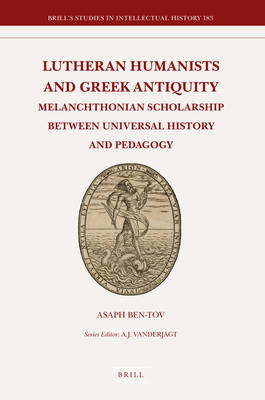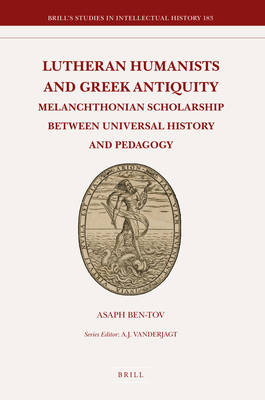
- Afhalen na 1 uur in een winkel met voorraad
- Gratis thuislevering in België vanaf € 30
- Ruim aanbod met 7 miljoen producten
- Afhalen na 1 uur in een winkel met voorraad
- Gratis thuislevering in België vanaf € 30
- Ruim aanbod met 7 miljoen producten
Zoeken
Lutheran Humanists and Greek Antiquity
Melanchthonian Scholarship Between Universal History and Pedagogy
Asaph Ben-Tov
€ 242,95
+ 485 punten
Omschrijving
The textual monuments of Greco-Roman antiquity, as is well known, were a staple of Europe's educated classes since the Renaissance. That the Reformation ushered in a new understanding of human fate and history is equally a commonplace of modern scholarship. The present study probes attitudes towards Greek antiquity by of a group of Lutheran humanists. Concentrating on Philipp Melanchthon, several of his colleagues and students, and a broader Melanchthonian milieu, a Lutheran understanding of Pagan and Christian Greek antiquity is traced in its sixteenth century context, positing it within the framework of Protestant universal history, pedagogical concerns, and the newly made acquaintance with Byzantine texts and post-Byzantine Greeks - demonstrating the need to historicize Antiquity itself in Renaissance studies and beyond.
Specificaties
Betrokkenen
- Auteur(s):
- Uitgeverij:
Inhoud
- Aantal bladzijden:
- 248
- Taal:
- Engels
- Reeks:
- Reeksnummer:
- nr. 183
Eigenschappen
- Productcode (EAN):
- 9789004179653
- Verschijningsdatum:
- 20/10/2009
- Uitvoering:
- Hardcover
- Formaat:
- Ongenaaid / garenloos gebonden
- Afmetingen:
- 163 mm x 239 mm
- Gewicht:
- 498 g

Alleen bij Standaard Boekhandel
+ 485 punten op je klantenkaart van Standaard Boekhandel
Beoordelingen
We publiceren alleen reviews die voldoen aan de voorwaarden voor reviews. Bekijk onze voorwaarden voor reviews.











